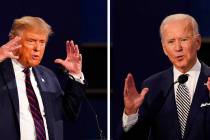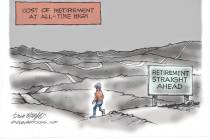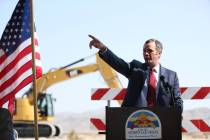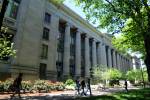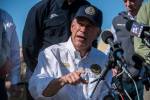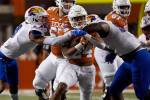EDITORIAL: NSHE-plagiarism issue highlights double-standard
If a student is found to have plagiarized an assignment at the University of Nevada, Las Vegas, the school’s extensive academic misconduct policy comes into play. The student is given the initial notification of suspicion of plagiarism, followed by a meeting, which can then lead to a formal hearing, followed by a number of possible sanctions if the student is found guilty.
Among those sanctions: failure of the course, suspension and even expulsion, depending on the level of misconduct. Those are severe consequences, but rightfully so, aiming to send students a strong message about not only doing their own work, but properly crediting sources that contributed to that work.
So why should plagiarism allegations be taken any less seriously when it involves the Nevada System of Higher Education? As the Review-Journal’s Bethany Barnes initially reported on Dec. 14, documents show Frank Woodbeck, executive director of the College Collaborative with the NSHE, copied large sections of a Brookings Mountain West report draft — without quotation marks or other proper attribution — to create a competitive grant.
Brookings Mountain West is a partnership between UNLV and the public policy nonprofit Brookings Institution in Washington, D.C. Ms. Barnes noted that Brookings had shared a copy of an unfinished report — on which it spent an estimated $200,000 — to create a multimillion-dollar grant program designed to improve the workforce in “STEM” industries: science, technology, engineering and math. The draft was labeled “do not circulate” and went to a variety of people viewed as stakeholders for input, a common way to vet research. But Mr. Woodbeck presented parts of the report to an interim legislative committee in June without attribution. Emails obtained by the Review-Journal show Brookings researchers were alarmed when they discovered their unfinished work had been hijacked.
After Brookings requested credit, the NSHE’s final report included an asterisk denoting, “Based in part on a framework and study provided by Mark Muro, Senior Fellow and Policy Director, Metropolitan Policy Program at Brookings, Washington DC.”
So little annotation would almost assuredly not hold up for a student, yet NSHE Chancellor Dan Klaich and some members of the Board of Regents pushed back, stating that plagiarism was too strong a term. Mr. Klaich argued, “You don’t plagiarize when you identify the author,” though as Ms. Barnes noted, his explanation is contradicted by emails and Brookings researchers. Outgoing regent and incoming state controller Ron Knecht wanted an investigation to exonerate those “falsely accused” and said he anticipated a bad end result for Brookings. Regent Michael Wixom didn’t view it as plagiarism, stating, “I think it’s been made a much bigger issue that it needs to be. I’m not sure why Brookings has approached this the way it has.”
Probably because Brookings spent well into six figures on the report, had a “do not circulate” version circulated and didn’t receive proper attribution.
UNLV recently fired an English professor who was found to have plagiarized the works of 18 people. Granted, that’s a more extreme example, but surely the NSHE allegations were at least as serious as a student plagiarizing work, and in fact probably more so, as this is the agency is in charge of higher education policy in Nevada.
Mr. Klaich and the NSHE have since offered an apology, which Brookings accepted (so much for Mr. Knecht’s theory), with both sides agreeing to move forward and the Board of Regents saying it won’t be looking into the matter any further. Still, as Regent Mark Doubrava told Ms. Barnes, it’s crucial that the standards students and faculty are expected to adhere to be applied to the entire system, including administrators.









